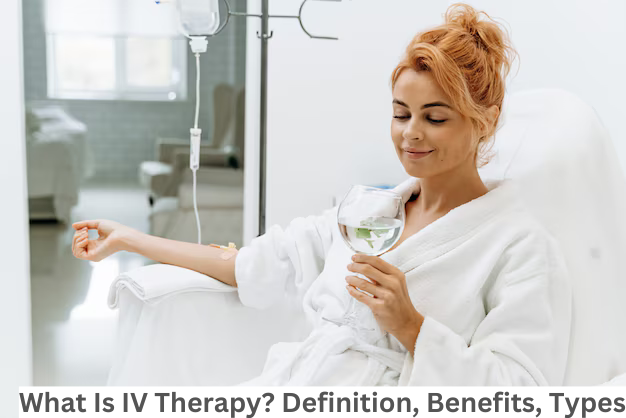What Is IV Therapy? Definition, Benefits, Types
In-Vitro Fertilization (IVF) is one of the most effective and well-known fertility treatments available today. It involves combining an egg and sperm outside the body in a controlled laboratory setting and then transferring the resulting embryo into the uterus to achieve pregnancy. IVF is a beacon of hope for couples struggling with infertility, offering high success rates and tailored approaches to suit individual needs.
It involves several steps, including:
1. Ovulation Stimulation: Medications are administered to stimulate the ovaries to produce multiple eggs.
2. Egg Retrieval: A minor surgical procedure is performed to retrieve the mature eggs from the ovaries.
3. Sperm Retrieval: Sperm is collected from the male partner or a donor.
4. Fertilization: The eggs and sperm are combined in a laboratory dish to allow fertilization to occur.
5. Embryo Development: The fertilized eggs, now called embryos, are cultured in a laboratory for several days.
6. Embryo Transfer: One or more embryos are transferred to the uterus, where they may implant and develop into a pregnancy.
Benefits of IVF Therapy
IVF offers hope to many couples struggling with infertility, including those with:
Female Factor Infertility: Conditions such as blocked fallopian tubes, endometriosis, or ovulation disorders can hinder natural conception.
Male Factor Infertility: Low sperm count, poor sperm motility, or abnormal sperm shape can affect fertility.
Unexplained Infertility: In some cases, the cause of infertility remains unknown, and IVF can be a viable option.
Types of IVF
Several variations of IVF exist to address specific infertility challenges:
1. Conventional IVF: This is the standard IVF procedure described above.
2. Intracytoplasmic Sperm Injection (ICSI): In ICSI, a single sperm is injected directly into an egg to facilitate fertilization. This technique is often used when there are severe male factor infertility issues.
3. Preimplantation Genetic Diagnosis (PGD): PGD involves testing embryos for genetic disorders before implantation. This can help identify embryos that are free from specific genetic diseases.
4. Frozen Embryo Transfer (FET): In FET, previously frozen embryos are thawed and transferred to the uterus. This can be a cost-effective option for couples who have undergone IVF and have extra embryos.
5. Donor Egg IVF: Donor eggs from a healthy woman are used in the IVF process. This can be helpful for women with poor egg quality or quantity.
6. Donor Sperm IVF: Sperm from a donor is used in the IVF process. This can be an option for couples with male factor infertility or single women who wish to have a child.
The IVF Process at New World Fertility Centre
At New World Fertility Centre, we offer comprehensive IVF services tailored to your individual needs. Our experienced team of fertility specialists will guide you through each step of the process, ensuring a personalized and supportive experience.
Here's a general overview of the IVF process at our center:
1. Initial Consultation: We will discuss your medical history, fertility challenges, and treatment options.
2. Diagnostic Tests: We may perform tests to assess your reproductive health, including hormone tests, semen analysis, and ultrasound.
3. Ovulation Stimulation: Medications are administered to stimulate the growth of multiple follicles in your ovaries.
4. Egg Retrieval: A minimally invasive procedure is performed to retrieve mature eggs from your ovaries.
5. Sperm Retrieval: Sperm is collected from your partner or a donor.
6. Fertilization: The eggs and sperm are combined in a laboratory dish to allow fertilization to occur.
7. Embryo Culture: The fertilized eggs, now called embryos, are cultured in a laboratory for several days.
8. Embryo Transfer: One or more embryos are transferred to your uterus, where they may implant and develop into a pregnancy.
9. Pregnancy Test: A pregnancy test is performed a few weeks after the embryo transfer.
Conclusion
IVF therapy offers hope to many couples struggling with infertility. At New World Fertility Centre, we are committed to providing world-class IVF services and personalized care to help you achieve your dream of parenthood.
Frequently Asked Questions (FAQs)
1. What exactly is IVF therapy?
IVF, or In-Vitro Fertilization, is a fertility treatment where an egg and sperm are combined in a lab setting to create an embryo, which is then transferred to the uterus. It’s commonly used to help people overcome infertility.
2. Who can benefit from IVF therapy?
IVF is suitable for couples and individuals facing issues like blocked fallopian tubes, male infertility, endometriosis, ovulation disorders, or unexplained infertility. It’s also an option for single parents and same-sex couples.
3. What is the success rate of IVF therapy?
IVF success rates vary based on age, underlying fertility issues, and overall health. Generally, younger women or those using donor eggs have higher success rates. Consult with a fertility expert to understand your specific chances.
4. How long does the IVF process take?
An average IVF cycle can take about 4–6 weeks from the initial ovarian stimulation to embryo transfer. However, timelines may vary based on individual response and treatment needs.
5. Are there risks associated with IVF?
IVF is generally safe, but like any medical procedure, it has potential risks. Common side effects include mild bloating, cramping, and, in rare cases, Ovarian Hyperstimulation Syndrome (OHSS). It’s important to discuss risks with your doctor.

 Jun-18-2025
Jun-18-2025